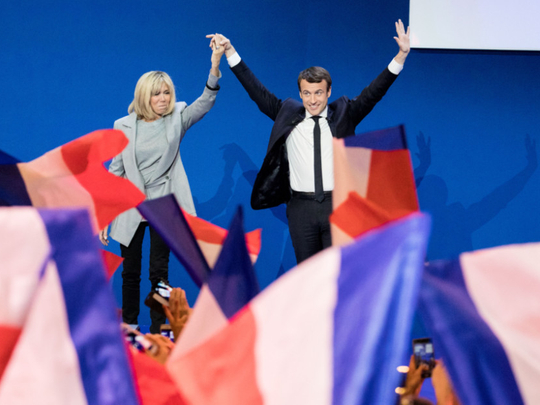
“Any other result would have been a European catastrophe and, for once, thank goodness, the opinion polls got it right. Emmanuel Macron has swept Marine Le Pen aside to become France’s next president,” said the Guardian in an editorial. “Mr Macron won by an even wider margin than the polls have consistently implied: 65.1 per cent to 35.9 per cent. It is the decisive majority against Ms Le Pen’s far-right racist challenge that France needed, and one of the biggest presidential wins in the history of the Fifth Republic, eclipsed only by Jacques Chirac’s victory over her father in 2002,” the paper said.
Observing that it was also a decisive setback for a right-wing populist tide threatening governments across the developed world in the wake of Brexit and Donald Trump’s election, the paper said: “The people of France have inflicted a major reverse on demagogic nationalism. Their country is safer for it. So is ours. So is Europe. We salute them for it. We wish Mr Macron every success. But his victory is more a cause for relief than celebration... He has a huge task of consolidation, particularly given that more than a third of French voters supported a far-right, anti-European, anti-immigrant and racist party leader, right up to the end. There is nothing to salute there.”
The New York Times meanwhile said the decisive election of Macron, “a 39-year-old political neophyte committed to the European Union, economic reform and traditional liberalism,” as president of France offers powerful relief to everyone who had feared that France could become the next country to succumb to the wave of populism, nationalism and anti-globalism sweeping through western democracies.
“A mysterious, 11th-hour email hack of the Macron campaign appears to have made little or no difference to the eventual outcome... The victory was remarkable in many ways. When he enters the Elysee Palace to start his five-year term next weekend, Mr Macron will be the youngest president in French republican history. He will be the first president in decades not to come from one of the traditional parties of the left or right. But for now, there is the satisfaction that despite the breakdown of traditional parties, despite considerable malaise in the French and European publics, and despite the email hack... French voters were not seduced by nativist illusions and instead chose a youthful and optimistic president who believes that France must remain open, progressive, tolerant and European.”
Commenting on the issue, USA Today said: “The French roundly rejected the isolationism and fearmongering of populist French candidate Marine Le Pen in the presidential election Sunday... For an America that engaged in two costly wars in the past century spawned by a divided Europe, that’s good news. Le Pen had promised a Brexit-like referendum aimed at pulling France out of the EU and rejection of the euro. France was a founding member of the EU and, as the world’s sixth largest economy, its abandonment of the EU could have spelt doom for the 50-year-old institution.”
The New Zealand Herald meanwhile noted that Macron’s economic liberalism “would have been characterised as right wing, especially in France,” not long ago, and said: “But left and right in Western democracies these days no longer refers to socialism and liberalism, the debate is between nationalism and globalism. Nationalism is economically protective and fearful of immigration and diversity. Globalists are socially tolerant and economically open to migrants, trade and foreign investment. For France, Macron represents a welcome change.”





_resources1_16a31069e4e_small.jpg)






